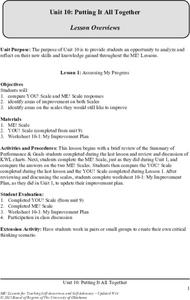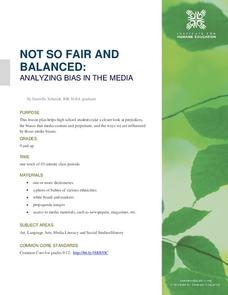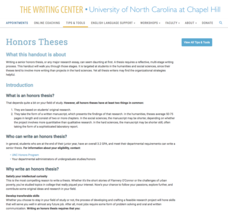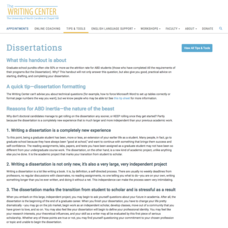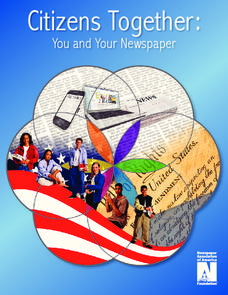University of Oklahoma
Learning About Special Education
The lessons in the second unit in a three-unit series provide students with the historical background of disability education. After reading about events that impacted attitudes towards disabilities and how learners are identified for...
Encyclopedia Britannica
Candidate Position Research
As part of their study of the US Presidential election process, class members research a presidential candidate's position on a specific topic or topics. Formatting their research as a pro/con question ("Should the Death Penalty Be...
University of Oklahoma
Putting It All Together: Assessing My Progress and Portfolio
Celebration time! The final unit in a 10-unit series asks learners to review their work and assess their progress. They complete another YOU! Scale and ME! Scale worksheet and compare the results with the worksheets they created at the...
University of Oklahoma
Advocating For My Needs After High School
A three-lesson unit teaches learners with special needs how to advocate for their needs after high school. Class members review appropriate was to disclose their disability during interviews and applications, and how to request...
University of Oklahoma
Understanding My Individualized Education Program
The final unit the series helps learners become familiar with the major components and vocabulary in their IEPs. Using a KWL chart, class members record information about their IEPs and set goals for themselves.
University of Oklahoma
Getting Started
"Getting Started" is a two-lesson unit focused on familiarizing high schoolers with the concepts of self-awareness and self-advocacy. Learners identify their strengths and weaknesses, likes and dislikes in a ME: Book that they will use...
National Woman's History Museum
Women, Propaganda, and War
Governments rely on propaganda to build support for wars. Class members examine six propaganda posters, two each from the Spanish-American War, World War I, and World War II, and analyze how the way women were portrayed in the posters...
Echoes & Reflections
Perpetrators, Collaborators, and Bystanders
After the Holocaust, the world grappled with how to bring justice to the Nazis. But what to do with the thousands—if not millions—who allowed it to happen? Young historians consider the issues of guilt, collaboration, and responsibility...
Newseum
Slanted Facts and Slippery Numbers
The Internet is known as the information superhighway, but sometimes it's hard to know when to hit the brakes on unreliable sources. Using a well-rounded lesson plan, pupils read and summarize articles about the gender pay gap and...
Institute for Humane Education
Not So Fair and Balanced: Analyzing Bias in the Media
Life is not always fair. Who's heard that before? This same concept moves to a larger scale using prejudice and bias. Pupils discuss where prejudice attitudes derive and how they develop throughout life. Reading comprehension...
ReadWriteThink
Designing Museum Exhibits for The Grapes of Wrath: A Multigenre Project
Challenge readers of John Steinbeck's The Grapes of Wrath to create a museum exhibit that uses artifacts to focus on one issue raised by the award winning story of the Great Depression, the Dust Bowl, and the Joads.
Society for Science & the Public
Easter Islanders Made Tools, Not War
When studying artifacts, especially tools, how do archaeologists determine what the devices were used for? In what ways might researchers' previous experiences influence their perception of an artifact? An article about researchers'...
University of North Carolina
Honors Theses
For those enrolled in a college honors program, four years of hard work culminate in one paper—an honors thesis. A handout outlines the steps to writing the paper, beginning with a sample timetable and time management instructions. Once...
University of North Carolina
Dissertations
Bring on the coffee—it's dissertation time! As a handout on dissertations explains, over 50 percent of PhD candidates never finish their dissertations. The handout, part of a larger series on specific writing styles, helps motivate...
University of North Carolina
Annotated Bibliographies
When researchers write a paper, they become curators of information. It's their job to determine the best sources of information on a topic and use those sources to inform their writing. As part of a larger series, a handout on annotated...
University of North Carolina
Abstracts
Some of the best information to include when writing a research paper doesn't come from books, magazine articles, or informational websites—it comes from dissertations. However, reading an entire dissertation is often a daunting task....
Newspaper Association of America
Citizens Together: You and Your Newspaper
Not all news in a newspaper comes in the form of a traditional article; photographs, charts, and even editorial cartoons help spread important information, too. A civics-based unit describes the parts of the newspaper as tools for...
California Department of Education
Learn to Reach Out
How can social media help my career? Explore the world of networking through a lesson about professional organizations. The fourth of six career and college readiness lessons has seniors research organizations in their professions of...
Social Media Toolbox
Social Media Education
Show what you know about social media! The 16th and final lesson in The Social Media Toolbox gives pupils the opportunity to share their social media experiences with their school communities. Groups identify the most important messages,...
Social Media Toolbox
Reporting with Social Media
What does it take to create news stories that are both informative and objective? Aspiring journalists walk the line between engagement and activism with lesson plan 15 of a 16-part series titled The Social Media Toolbox. Grouped pupils...
Social Media Toolbox
Social Media Messages
What are the elements of a good social media post? The 13th activity in the 16-part Social Media Toolbox incorporates all of the typical components found in a Facebook or Twitter post. Scholars work together to create great posts based...
Social Media Toolbox
Twitter Time
Tweet all about it! Junior journalists explore the Twittersphere to determine its effectiveness as a news broadcasting tool in the 12th installment of the 16-part Social Media Toolbox. Participants follow and record their observations of...
Social Media Toolbox
About Facebook
If everyone is on Facebook, should the school's news publication be as well? Scholars study a social media giant in the 11th lesson from The Social Media Toolbox's 16-part series. The activity combines individual study and collaboration...
Social Media Toolbox
Cyberbullying
What can we do to make our school community more aware of cyberbullying? From The Social Media Toolbox, instructional activity 10 of 16 takes on the tough topic of bullying. Learners research cyberbullying through online research, then...




